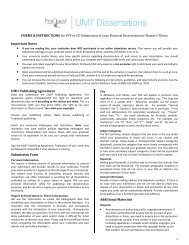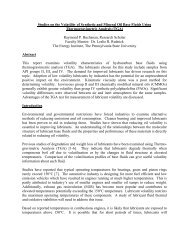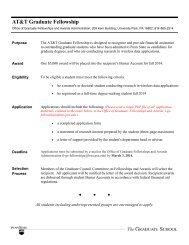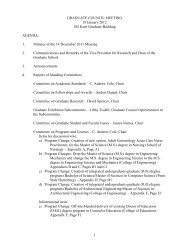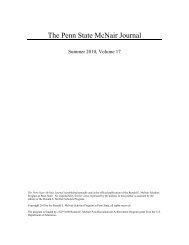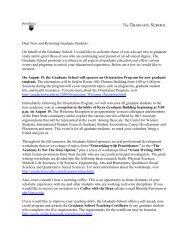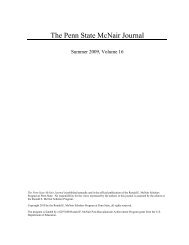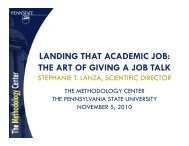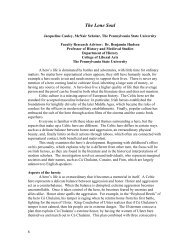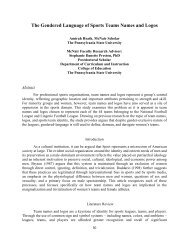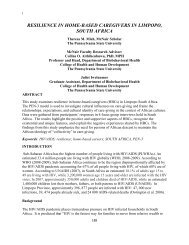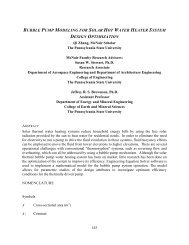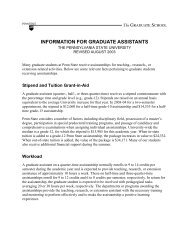1 GRADUATE COUNCIL MEETING 9 May 2012 102 Kern Graduate ...
1 GRADUATE COUNCIL MEETING 9 May 2012 102 Kern Graduate ...
1 GRADUATE COUNCIL MEETING 9 May 2012 102 Kern Graduate ...
Create successful ePaper yourself
Turn your PDF publications into a flip-book with our unique Google optimized e-Paper software.
H6<br />
Other major universities in the CIC (for example, Ohio State, Michigan State, and Michigan) and<br />
around the country (Yale, Cornell, UCLA, Florida, and UPenn) have programs in African<br />
Studies. None of them is, however, conceived explicitly as an intellectual partnership between a<br />
major discipline and African Studies. Owing to its uniqueness, the proposed program provides<br />
an academic niche, which will contribute to Penn State’s vision of becoming a leader in<br />
multidisciplinary, international, and multicultural scholarship.<br />
In summary, the proposed dual-title doctoral degree program will:<br />
• provide a framework within which doctoral students can pursue an integrated suite of<br />
regional/thematic courses to complement their specialization in their major discipline;<br />
• use African Studies graduate faculty to enrich the multidisciplinary training and research<br />
activities of Penn State doctoral students who have an interest in Africa;<br />
• enhance the standing of Penn State in African Studies among CIC universities; and<br />
• enhance the marketability of Penn State doctoral students by making it possible for them<br />
to acquire a unique qualification, which can attract a wide range of employers in<br />
academia, the US government, bilateral and multilateral international organizations and<br />
international non-governmental organizations.<br />
B. African Studies As a Field of Study and Research<br />
African Studies is an interdisciplinary field of enquiry. It borrows from the paradigms of the<br />
humanities, social sciences and natural sciences, to engage scholarship on the African condition<br />
covering the pre-colonial, colonial and post-colonial periods.<br />
African Studies experienced its birth as an academic discipline in the 1950s-1960s as the product<br />
of two corresponding global dynamics: the independence movement in many African countries<br />
and the civil rights movement in the US. During its formative period, the field was dominated by<br />
the humanities and arts, especially history, literature, and languages. Early academic initiatives<br />
focused on rewriting African history from an African perspective (for example, Ali Mazrui and<br />
Basil Davidson); and on energizing African literature (for example, the African Writers Series by<br />
the Heinemann Press, which published significant foundational works like Achebe’s Things Fall<br />
Apart and Cyprian Ekwensi’s Palm Wine Drunkard). As a number of newly-independent<br />
African countries rejected the West and experimented with socialist and Marxist models, this<br />
period also witnessed the growth of intellectual traditions in political economy. African<br />
scholarship in these disciplines was undertaken in major universities in North America and<br />
Europe and in the emerging universities on the continent itself. In addition to its being<br />
recognized as an academic discipline, one of the concrete manifestations of the growth of<br />
African Studies during the period was the founding of the African Studies Association of<br />
America (ASA) in 1957, followed by the founding of the association’s journal, the African<br />
Studies Review. The ASA has been an important focal point for the development of African<br />
Studies in the US by bringing Africanist scholars and policy makers together in one forum to<br />
tackle the main problems facing the continent and its peoples. The growth of the ASA is a<br />
barometer of the simultaneous growth and maturity of African Studies. Today, the ASA has 325<br />
3



